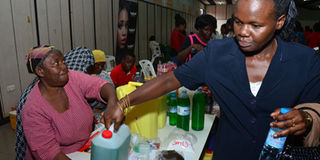Profit from liquid soap business

A customer picks a five-litre jerry can of liquid soap from a stall. PHOTO BY MICHAEL KAKUMIRIZI
What you need to know:
- People will always have something to wash or clean. That is why investing in making liquid soap business can be a good source of income, Dorothy Nakaweesi writes.
Liquid soap is a product whose demand is quickly increasing in Uganda’s market.
Since it is a consumable product, almost every household needs it on a daily basis in hand or machine washing.
Gone are the days when most of the brands were imported but right now many cottage businesses making liquid laundry soap have come up because of its ease to produce.
This means if you invest in this project, you will be sure of making a tidy profit thanks to the steady market considering that people must always wash and clean something.
Experts say in just a day, you can acquire skills of how to produce liquid laundry soap. If equipped with starting capital, in a day or two you can be in business at your backyard, garage or space room.
Capital investment
So, what does it take to start this kind of business? According to Uganda Investment Authority, if you want to establishing a large scale plant with a capacity of about 260 liters of liquid soap per day, you will need about $4,100 (Shs14 million) to start.
The total production cost at full operation capacity is estimated at $197,521 (Shs711 million), generating annual revenue of $249,600 (Shs898 million).
However, this is one business one can start on a small scale preferably at the backyard with little starting capital of about $950 (Shs3.4 million) to buy a small machine to process the ingredients.
Raw materials
Raw materials are readily available in Uganda from chemical shops.
Ms Hope Kayeny, the founder of Fro Textured, is one of the Ugandans involved in producing liquid soap.
In an interview with Prosper magazine, she admits that this is a lucrative business venture you can start.
“My advice is for whoever wants to start this business, start from interesting your neighbours and close friends then spread to other customers,” Ms Kayeny shared.
She shares that the market for liquid soap is spread all over the country especially in supermarkets, schools, hospitals, hotels, hostels, retail shops and washing bays.
Production process
It is important to thoroughly boil the lye solution – a basic chemical for making soap - so that it will become clean and clear.
When making this alkaline solution used for cleaning, the proportion of one litre lye concentrate solution is: 45 per cent or 450ml caustic potash and 55 per cent or 550ml of water.
Then weigh the 450ml caustic potash accurately and dissolve this in 550ml water. Mix the lye solution well in a pail. Place the pail with the lye solution on a big pail containing hot water so that the solution becomes slightly warm.
Making the soap
Mix one litre of coconut oil and 560ml of the lye solution in a stainless steel container of an electric mixer.
When the mixture is slightly blended, transfer the stainless container to the stove. Continue mixing while the mixture is being boiled or until its temperature reaches 180°F.
Then switch off the stove to maintain the 180°F temperature. Meanwhile, mix the Ethylene Diamine Tetra Acetic Acid (EDTA) with a little water in a separate container.
Slowly add 428 to 432ml of boiling water to the mixture while stirring continuously.
Continue stirring the mixture for one hour until it becomes clear.
Allow 10 to 15 minutes to pass before adding the Coconut Diethanolamide (CDEA). The CDEA makes the soap produce more lather. Add 2 to 5ml of lemon fragrance to the liquid soap.
When all of the ingredients have been thoroughly mixed, switch off the stove and the electric mixer. Remove the stainless steel container from the stove and allow the liquid laundry soap to cool.
When cooled, pour the soap into the plastic bottle. Before using the soap, set aside for some time to let the caustic soda lose its effect. The liquid laundry soap is now ready to use.
Incentives available
According to UIA, government supports industrialisation in Uganda through; tax exemptions, land, basic infrastructure, grants, long-term loans and a liberalised market.
“The manufacturers are allowed to recover their start-up cost to the tune of 25 per cent of their expenditure in the year of income for four years and initial allowance of 50 per cent,” UIA shares.
Because this kind of investment requires you to acquire skills –support can also be accessed from Private Sector Foundation through some of their projects like the Skills Development Facility.




